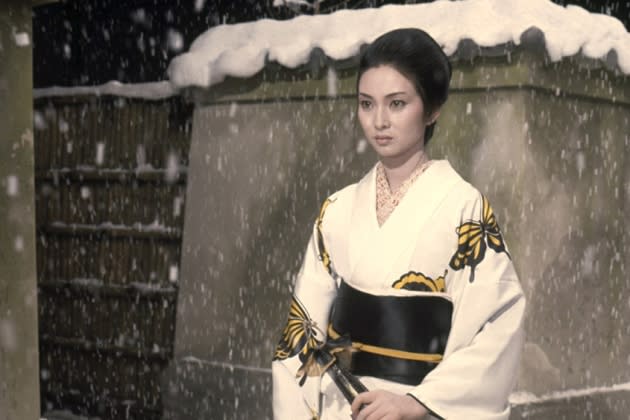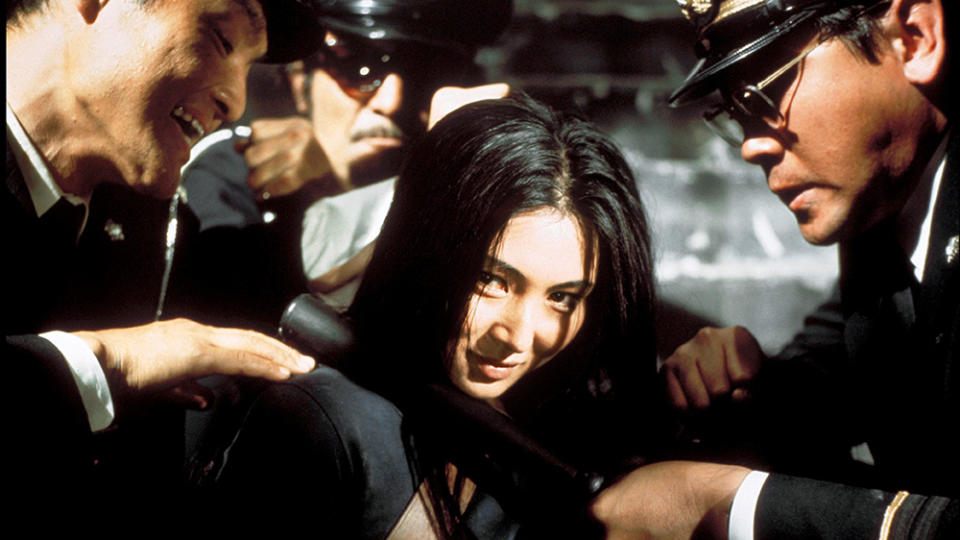The Lumière Festival Presents A Trio of Stunning Meiko Kaji Movies
- Oops!Something went wrong.Please try again later.
- Oops!Something went wrong.Please try again later.
- Oops!Something went wrong.Please try again later.
- Oops!Something went wrong.Please try again later.

30 years after Japanese moviegoers first heard “The Flower of Carnage,” the theme song of Toshio Fujita’s “Lady Snowblood” sung by star Meiko Kaji, it came to mainstream Western audiences via Quentin Tarantino’s “Kill Bill.” Kaji’s sweet, clear voice sings about a “woman who walks at the brink of life and death,” and Uma Thurman slices the top off Lucy Liu’s head, where three decades before, her song had soundtracked another grievously wounded, kimono-ed beauty whose last breath is captured in full-face close-up before she staggers to her knees in the snow. The trio of Kaji’s films, including “Lady Snowblood,” playing the Lumière Festival this week, invite us to (re)visit this fascinating icon’s work fresh from the source, and find in it a bristling, innovative vitality often absent from the many movies that cite it as an influence.
1973’s “Lady Snowblood” is probably the most “respectable” of the three films featured, with Kaji playing a young woman whose very conception was a calculated act, orchestrated by her mother to bring into the world a child whose sole purpose in life would be implacable revenge on the miscreants who raped her and murdered her husband and son. Director Fujita was already established in the youth-oriented melodrama genre, so the highly stylized violence of “Snowblood” in which geysers of bright-red blood gush from the most superficial wounds, was a departure, that nonetheless became the work for which he is best-known internationally.
More from Variety
“Female Prisoner 701: Scorpion,” by contrast, was the first film from Shunya Ito, and stars Kaji as a woman betrayed by her faithless police detective boyfriend and sent to a women’s prison. There she is reborn as “Scorpion,” a taciturn rebel with snarling eyes glimpsed between the parted curtains of her whipping, whirling, black hair, who has a genius for absorbing the sadistic punishments of sneering male guards and toxic female fellow prisoners alike, only to repay them tenfold at the earliest opportunity. Ito’s filmmaking bravado elevates the grubby material (even a gang rape scene, shot through a glass floor becomes a curiously dreamlike experience), but arguably this was only the dry run for the heights of expressivity he would achieve in the first of the film’s three sequels.

“Female Prisoner Scorpion: Jailhouse 41” is, essentially, an exploitation masterpiece, in which an incoherent story featuring Scorpion staging a mass prison breakout, is merely an excuse for giddy grindhouse experimentation. Surrealist interludes; bodies that turn into autumn leaves that blow into winter; grisly garottings performed on rotating rigs; “Jailhouse 41” is truly dazzling in its formal inventiveness. Yet so much of the visual exuberance is built around a simple yet immensely potent image: Whether in partial dissolve, or spliced onto one half of the screen, or framed from brow to chin to fill the entire field of the camera’s vision, Kaji’s is the kind of face that reminds you why the close-up was invented.
All three movies came out within a 16 month period, yet represent only the tiniest sliver of Kaji’s filmography. In the four years 1969-1973 she appeared in no fewer than 40 features, a borderline inhuman rate of work that contributed to a disillusion with the industry that pushed her more toward television in the 1980s. As this pulpy, exploitative, gruesome and fantastic triptych proves, the small screen’s gain was the big screen’s colossal loss; seldom has the archetype of the vengeful virago been given more exquisitely cinematic form than in Meiko Kaji, a human flower of carnage indeed.
Best of Variety
The Best Pop Culture Halloween Costumes for 2022: From 'House of the Dragon' to 'Euphoria'
Constance Wu Gets Candid in Revealing New Memoir 'Making a Scene'
Sign up for Variety’s Newsletter. For the latest news, follow us on Facebook, Twitter, and Instagram.

